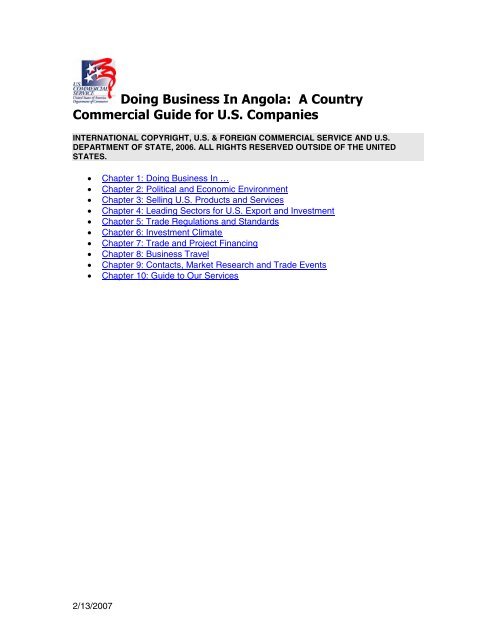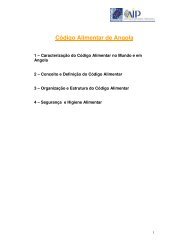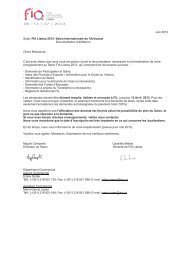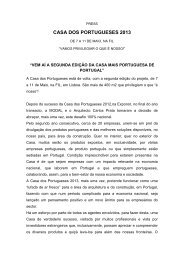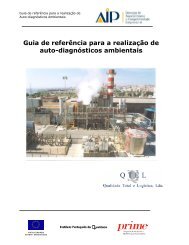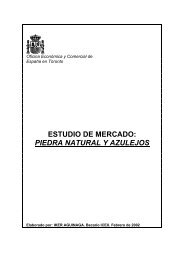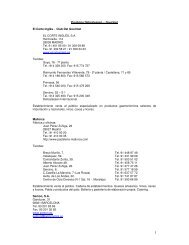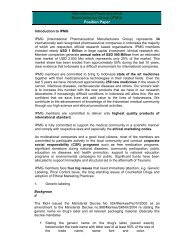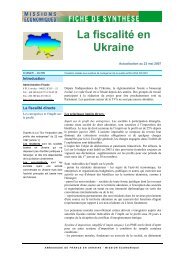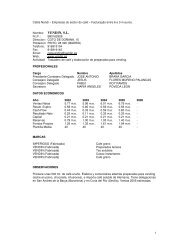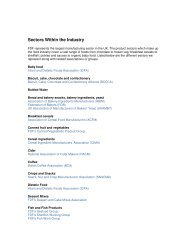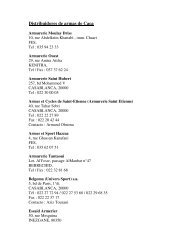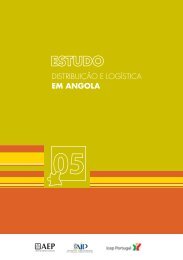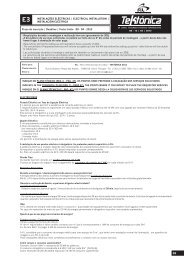Doing Business In (Insert Country Name Here)
Doing Business In (Insert Country Name Here)
Doing Business In (Insert Country Name Here)
You also want an ePaper? Increase the reach of your titles
YUMPU automatically turns print PDFs into web optimized ePapers that Google loves.
<strong>Doing</strong> <strong>Business</strong> <strong>In</strong> Angola: A <strong>Country</strong>Commercial Guide for U.S. CompaniesINTERNATIONAL COPYRIGHT, U.S. & FOREIGN COMMERCIAL SERVICE AND U.S.DEPARTMENT OF STATE, 2006. ALL RIGHTS RESERVED OUTSIDE OF THE UNITEDSTATES.• Chapter 1: <strong>Doing</strong> <strong>Business</strong> <strong>In</strong> …• Chapter 2: Political and Economic Environment• Chapter 3: Selling U.S. Products and Services• Chapter 4: Leading Sectors for U.S. Export and <strong>In</strong>vestment• Chapter 5: Trade Regulations and Standards• Chapter 6: <strong>In</strong>vestment Climate• Chapter 7: Trade and Project Financing• Chapter 8: <strong>Business</strong> Travel• Chapter 9: Contacts, Market Research and Trade Events• Chapter 10: Guide to Our Services2/13/2007
Chapter 1: <strong>Doing</strong> <strong>Business</strong> <strong>In</strong> Angola• Market Overview• Market Challenges• Market Opportunities• Market Entry StrategyMarket OverviewReturn to top2006 Economic <strong>In</strong>dicators and Trade Statistics---------------------------------------------------------------- GDP (US $ bn): 66.8-- Real GDP growth (%): 19.5-- <strong>In</strong>flation (%): 10-- Exports of goods fob (US$ b): 30.7-- Exports to the US (% share): 32.2-- Imports of goods fob (US$ b): 9.4-- Imports from the US (% share): 19.1-- Current-account balance (US$ b): 8.8-- Foreign-exchange reserves excl gold (US$ b): 4.8-- Exchange rate (av) Kz:US$: 80.01Sources: IMF, WB, Government of Angola, Economist <strong>In</strong>telligence Unit-- Angola is enjoying one of the fastest growth rates in the world due to high oil prices,increased production and a post-civil war reconstruction boom.-- The Angolan market presents a high return, but high risk, opportunity to investors andexporters.-- Angola’s first nationwide elections may be held in late 2008.-- Major trading partners include the U.S., Portugal, China, South Africa, Japan, andBrazil. Trade with the U.S. is dominated by the oil industry.Market ChallengesReturn to topBarriers to Market Entry--------------------------------- All investments above $100,000 require government approval.-- The registration and licensing process is bureaucratic and time-consuming.-- The government must approve any project involving a concession - this affects allpetroleum, mining, and fisheries investments.-- Special regulations control entry into the telecommunication and finance sectors.-- Companies must submit an Environmental Impact Study for approval prior toconsideration of any project that could impact the environment.2/13/2007
-- Corruption is pervasive in Angola and is a potential damper to investment.Local requirements--------------------------- Local content requirements that require companies to purchase some of their servicesfrom companies that are wholly or partially Angolan-owned.-- As of 2005, companies in the fisheries sector must partner with local Angolan firms.-- Angola is in the process of requiring companies to hire Angolan nationals, unlessthere are no qualified nationals available. The Ministry of Petroleum conducts annualsurveys to ensure that oil companies are increasing the proportion of Angolanemployees in their workforces, including those in management positionsMarket OpportunitiesReturn to topBest Prospects-- Oil/Gas Machinery and Services-- Mining Equipment-- Agriculture Machinery and Equipment-- Telecommunications Equipment-- Financial Services-- Construction Machinery and Equipment-- Fishing boats and fishing equipment for both large small scale fishing.-- Aviation equipment and servicesMarket Entry StrategyReturn to top-- Performing due diligence using local law firms specializing in doing business in Angolais essential.-- A visit or a series of visits to Angola is highly recommended and can help investorsfind local partners.-- Forming a joint venture with a local company often facilitates the process ofestablishing and running a business in Angola.-- Finding a local partner, well-known to the government, often facilitates the process oflearning about business opportunities in Angola.-- Companies often use experienced agents to coordinate marketing, logistics anddistribution.-- Be prepared for market entry to take longer and cost more than in other countries.-- <strong>Business</strong>es which can provide follow-on service and/or training in conjunction withtheir products often have an advantage in the market.2/13/2007
2006, against 320 issued in 2005. The Guichet Único plans to establish a website thatwill start online registration in 2007.<strong>In</strong>vestments benefit from a standardized set of incentives approved under Law 17/03 onTax and Customs <strong>In</strong>centives for Private <strong>In</strong>vestment, approved by the National Assemblyin July 2003. <strong>In</strong>vestors should apply for these incentives along with their application toANIP, the National Agency for Private <strong>In</strong>vestment. <strong>In</strong>vestments are treated differentlyaccording to the amount invested. <strong>In</strong>vestments of less than $100,000 for foreigninvestors are not subject to the investment law, do not qualify for incentives (includingremitting profits abroad), and do not require ANIP approval. <strong>In</strong>vestments greater thanthese amounts will be reviewed by the Angolan government to confirm that theinvestment does not contravene economic and social development strategies set out bythe government, strategic guidelines and objectives established in economic policyprograms, and legislation in force. The Private <strong>In</strong>vestment Law also expressly prohibitedforeign investment in the areas of defense, internal public security and state security;and other areas considered by law to be the State's exclusive responsibility.Foreign investment of between $100,000 and $5 million is subject to a "PriorDeclaration" regime in which the investor submits an investment proposal withsupporting documentation to ANIP, which then has 15 days from receipt to reach adecision. <strong>In</strong> practice, ANIP normally exceeds the 15-day approval period, partly due toan increased volume of investment proposals since 2004.<strong>In</strong>vestments greater than $5 million and those, irrespective of value, that may only becarried out under a concession or jointly with state-owned companies are subject to the"Contractual" regime. Under these circumstances, the investor and ANIP negotiate thespecific obligations of the investment contract between the investor and the government.The investor submits the contract with all legal, economic, financial and technicaldocuments describing the investment to ANIP. ANIP has 30 days to review the contract,during which time it will consult relevant ministries and negotiate with the investor. ANIPthen forwards its recommendation to the Council of Ministers, which has 30 days toreview the application. <strong>In</strong> practice, the Council of Ministers’ approval usually takes 45 ormore business days.ANIP, the Embassy of Angola in Washington D.C., the Angola Chamber of Commerceand <strong>In</strong>dustry (CCIA), and the U.S.-Angola Chamber of Commerce can provideassistance with establishing an office (see Chapter 9 for contact information).FranchisingReturn to topThere are no restrictions on franchising in Angola. A small but growing number offranchises are operating in the country, including the South African fast food restaurants“Nandos” and “Steers” and the retail supermarket “Shoprite.”Direct MarketingReturn to top2/13/2007
U.S. companies may market products through an established importer in Angola, bywinning a tender, through investment, or by opening an office in Angola. Portugalremained the top exporter of consumer goods to Angola in 2005 and accounted for 19.2percent of all Angolan merchandise imports. South Africa was the second largestexporter, accounting for 12.6 percent, Brazil was third with 7.6 percent, and Chinamoved up from seventh to fourth largest exporter, representing 6.5 percent. Competitivepricing, financing and reliability of supply are essential to enter and become successfulin the Angolan market.Joint Ventures/LicensingReturn to topThe government of Angola allows joint ventures under the private investment law, whichalso regulates the amount and form of capital invested. Foreign investors are oftenencouraged or even pressured to form joint ventures with local Angolan partners.Selling to the GovernmentReturn to topConstruction is one of the fastest growing sectors in Angola as the country seeks torebuild infrastructure destroyed by 27 years of civil war. The government, mainlythrough its Office of National Reconstruction, is rebuilding roads, railways, dams,bridges, electricity grids and water supply networks. The government of Angola solicitsbids for supplies and services in local and international publications 15 to 90 days beforethe bids are due. However, most projects, rather than being publicized in officialannouncements, are spread by word of mouth through the local business community. <strong>In</strong>this respect, the well-connected local partner is indispensable for learning aboutupcoming projects. Foreign bidders are welcome, though Angolan companies and jointventures that include Angolan partners are given preferential consideration. Agovernment ministry, department or agency provides bid documents for a nonrefundablefee. Completed bids, accompanied by the required security deposit, areusually submitted directly to the requesting ministry. Bids are often opened in thepresence of bidders or their representatives. However the bidding process often doesnot meet international standards of objectivity and transparency. The governmentfrequently does not publicize tenders to potential local and international bidders. Sellerswill not be paid if they sell to state institutions which cannot prove that the relevantexpenditure has been authorized in the government annual budget. Sellers mustconduct due diligence by using a local lawyer to ensure that the expenditure has beenbudgeted.Distribution and Sales ChannelsReturn to topProduct distribution in Angola can be problematic because of poor transportationinfrastructure. The ports of Luanda and Lobito allow imports to reach most of the coastalpopulation but access to the interior provinces is limited. The rebuilding of railways androads should improve distribution beyond the coastal cities – major rail lines are2/13/2007
expected to be completed by the end of 2008. Major roads have been cleared oflandmines and are in the process of rebuilding/repaving. Some parts of the interior areonly accessible by air. Some local companies have networks of rural distributors, butmany firms opt to reach rural markets through wholesale arrangements with localentrepreneurs. The Angolan mail system does not function to international standards.Packages and correspondence are generally sent through courier services. DHL is themost widely used international courier service in Angola, with offices in Luanda and fiveprovincial cities.Electronic CommerceReturn to topLimited access to the <strong>In</strong>ternet and to credit cards and an inefficient mail system inhibitthe growth of electronic commerce in Angola. Angola had an estimated 130,000 <strong>In</strong>ternetusers in 2006, equivalent to 1.3 percent of the population. Since the end of the war,computer usage has increased, but most Angolans still lack access to the <strong>In</strong>ternet andelectronic commerce. A number of <strong>In</strong>ternet cafes operate in Luanda and several majorprovincial cities; high speed <strong>In</strong>ternet is available in major cities. Twelve Angolancompanies currently provide <strong>In</strong>ternet service, and several Angolan companies arelicensed to sell computers. There are no business to business websites currentlyavailable.Trade Promotion and AdvertisingReturn to topAngola has one government-owned television network with two channels and severalA.M. and F.M. radio stations, as well as a government-run daily newspaper. A vocalalternative press publishes on a weekly basis in Luanda and accepts advertising. SeeWeb Resources at the end of this chapter for contact information. Billboard advertisingis also common. Building and maintaining a good reputation for the company and/orproduct is key due to substantial reliance on customer referrals.PricingReturn to topAfter years of triple-digit inflation during the civil war, the economy has stabilized theexchange rate between 80 and 81 Kwanzas since 2005. Prices are commonly listed inboth dollars and kwanza but show relative stability reflecting the lowered inflation rate.However, the cost of doing business in exceptionally high in Angola and must beincluded in market pricing calculations. Prices on consumer goods and professionalservices are relatively high and real estate prices are some of the highest in the world.The sales tax varies between 2 and 30 percent depending on the type of merchandise.Sales Service/Customer SupportReturn to top2/13/2007
Customer service in Angola is less responsive than in the U.S, but more Angolans arenow demanding better service. Firms offering reliable post-purchase customer supportwill have an advantage over other firms, particularly for technically sophisticated ordelicate equipment.Protecting Your <strong>In</strong>tellectual PropertyReturn to topThe Angolan <strong>In</strong>stitute for <strong>In</strong>dustrial Property (IAPI) within the Ministry of <strong>In</strong>dustryenforces intellectual property rights for trademarks, patents, and designs; the Ministry ofCulture is responsible for authorship, literary and artistic copy rights. Angola has basicintellectual property rights protection and is working to strengthen existing legislation andenforcement. <strong>In</strong> August 2005, Angola’s National Assembly adopted the ParisConvention for the Protection of <strong>In</strong>dustrial <strong>In</strong>tellectual Property. Angola is a member ofthe World <strong>In</strong>ternational Property Organization (WIPO). For more information, please seeChapter 6.Due DiligenceReturn to topThe U.S. Embassy strongly recommends the use of an Angolan lawyer and thepreparation of a binding contract prior to any business dealings, including rental or leaseof property. Oral agreements are not enforceable in Angola. The lawyer should conductdue diligence inquiries prior to the conclusion of any purchase or other contractualagreement. The U.S. Embassy can provide a list of lawyers.Local Professional ServicesReturn to topSee Chapter 9 for a list of local service providers.Web ResourcesReturn to topPublic Televsion: http://www.tpa.aoNational Broadcasting: http://www.rna.aoLuanda Commercial Antenna: http://www.ebonet.net/lac/Radio Ecclesia: http://www.recclesia.orgNational Press Agency: http://www.angolapress-angop.aoJournal of Angola: http://www.jornaldeangola.comSemanario Angolense: http://www.semanarioangolense.comAngola Trade Directory: http://www.dcda.netMinistry of Commerce: http://www.dnci.netExpo Angola: http://www.expo-angola.snet.co.ao (website under construction)<strong>In</strong>formation about Expo-Angola trade fairs can be obtained through:2/13/2007
A.I.A. (Angolan <strong>In</strong>dustrial Association)Tel. 244 222 378252Fax 244 222 380825E-mail aia@netangola.com2/13/2007
Return to table of contentsChapter 4: Leading Sectors for U.S. Export and<strong>In</strong>vestment• Agricultural SectorCommercial Sectors• OIL/GAS FIELD MACHINERY (OGM) / OIL, GAS, MINERAL PROD/EXPLORSERV. (OGS)• MINING INDUSTRY EQ. (MIN)• AGRICULTURAL MACH. & EQ. (AGM)• TELECOMMUNICATIONS EQ. (TEL)• FINANCIAL SERV. (FNS)• COMPUTERS/PERIPHERALS (CPT)• AUTOS/LIGHT TRUCKS/VANS (AUT)2/13/2007
OIL/GAS FIELD MACHINERY (OGM) / OIL, GAS, MINERAL PROD/EXPLOR SERV.(OGS)OverviewReturn to top2004 estimate($million)2005 estimate($million)2006 estimate($million)Total Market Size 800 900 1000Total Local Production 10 20 20Total Exports 0 0 0Total Imports 790 880 950Imports from the U.S. 600 650 750The above are unofficial U.S. Embassy estimatesAngola is currently the second largest oil producer in sub-Saharan Africa after Nigeriawith production in December 2006 exceeding 1.4 million barrels per day and may reach2.0 million during 2007. Angola is a member of OPEC beginning in 2007. Some blocksare well established, such as Block 0 operated by Chevron, while production from Blocks15, 17, 18, and 24, began in 2005. Much of Angola’s future oil production will come fromdeepwater and ultra-deepwater blocks.OpportunitiesReturn to topOn May 22, 2006, Sonangol announced winners of an international bidding round forseven new oil concessions in Blocks 1, 5, and 6 (shallow-water); and 15,17, 18, and 26(deepwater), among them ENI, which offered a USD 900 million signature bonus, andSSI with 1.1 billion.<strong>In</strong> the first quarter of 2006, Sonangol conducted another licensing round for 23 onshoreconcessions in the Kwanza Basin and the ultra deepwater blocks 24 and 25, where ENI,Sinopec, and Petrobras won as operators.A consortium of international oil firms, led by Chevron, is developing a $4 billion liquefiednatural gas (LNG) plant in Soyo to take advantage of the estimated 25 trillion cubic feetof natural gas reserves. <strong>In</strong> mid-2005, the joint venture partners for the LNG facilitysigned Front-End Engineering Design (FEED) contracts for the facility with OverseasBechtel <strong>In</strong>c. on one hand and a consortium of Kellogg Brown & Root <strong>In</strong>c., JGCCorporation of Japan, and Technip USA Corporation, to execute 15-month FEEDstudies. These studies are completed and a final investment decision has been made,with one of the two contractor groups Bechtel <strong>In</strong>c. has been awarded the contract toperform engineering, procurement, construction and commissioning (EPCC) activities forthe facility.Angola’s Finance Ministry has partnered with China to move ahead with construction ofa USD 3.5 billion oil refinery in Lobito. The state oil company Sonangol announced inDecember 2006 that construction should start in mid 2007. The refinery will be built as a2/13/2007
joint venture by Sonangol and Sinopec <strong>In</strong>ternational. The new refinery is expected toproduce 200,000 barrels per day.<strong>In</strong> June 2005, the government of Angola lifted force majeure in Cabinda province, underwhich the government of Angola had prohibited onshore oil exploration since the 1990sdue to security concerns. Devon Energy, Occidental Petroleum, and Roc Oil will rampup exploration activities in their Cabinda onshore concessions.ResourcesReturn to topU.S. EmbassyLuis Fernandes, Commercial SpecialistTel. 244 222 641000 ext. 1646Fax 244 222 641232E-mail LuisF@state.govSonangolTel. 244 222 632328 / 632329Fax 244 222 391915E-mail secretariageral@sonangol.co.aoWeb www.sonangol.co.aoChevronTel. 244 222 692600Fax 244 222 392646Web www.chevron.comBPTel. 244 222 637300Fax 244 222 637333Web www.bp.comExxonMobilTel. 244 222 679000Fax 244 222 679096Web www.exxonmobile.comDevon EnergyTel. 244 222 372235Fax 244 222 372129Web www.devonenergy.comHalliburtonTel. 244 222 310926Fax 244 222 310636Web www.halliburton.comMinistry of PetroleumAv. 4 de Fevereiro2/13/2007
Caixa Postal 1205 – LuandaTel. 244 222 372373 / 396178Fax 244 222 3374402/13/2007
MINING INDUSTRY EQ. (MIN)OverviewReturn to top2004 estimate($million)2005 estimate($million)2006 estimate($million)Total Market Size 50 60 70Total Local Production 0 0 0Total Exports 0 0 0Total Imports 50 60 70Imports from the U.S. 25 25 25The above are unofficial U.S. Embassy estimatesAngola is the world's fourth-largest diamond producer after Botswana, Russia and SouthAfrica. <strong>In</strong> 2005, Angola sold an estimated 6.6 million carats of diamonds, at a value ofabout $764 million. Diamond revenue for 2006 is expected to top $1 billion. The currenttrend in the diamond industry is leading to increase government control through formalconcessions to industrial mine operators and decrease production by informalprospectors. With this shift from informal to industrial production, Angola will need toimport substantial quantities of mining equipment. Caterpillar, through the South Africandistributor Barloworld Equipment, is one of the major suppliers of mining equipment toAngola.On November 3, 2005, the first Angolan diamond cutting and polishing plant wasinaugurated. The $10 million factory is a partnership between Sodiam, a subsidiary ofEndiama, and the LLD diamond company. <strong>In</strong> December 2006 Sodiam began sellingjewellery made with diamonds cut in Angola. The plant can process $20 million indiamonds monthly. At full capacity the plant could process 40 percent of Angola’sdiamond production. Endiama has also opened representative offices in Hong Kong andTel Aviv to market Angolan diamonds.Legal sales of rough diamonds may occur only through Endiama, the government’sdiamond parastatal company. The Government of Angola has established an exportcertification scheme consistent with the “Kimberley Process” to identify legitimateproduction and sales. The Government is working to end uncontrolled alluvial mining byindividual prospectors. <strong>In</strong> the past, this led to expulsions of alluvial miners identified asillegal immigrants. There have been some charges of abuses committed against alluvialminers, both Angolan and foreign, by private security forces operating employed byprivate diamond concerns. The Angolan government is working to better regulateprivate security forces and improve their respect for human rights.Angola also has substantial reserves of granite, iron ore, phosphates, feldspar, bauxite,uranium, and gold.OpportunitiesReturn to top2/13/2007
The Catoca Diamond Mining Project operates Angola’s largest kimberlite diamond mine,accounting for 65 percent of the country’s total production. Producing more than fourmillion carats of rough diamonds annually, the project is expected to generate $11 billionover the next 40 years. Catoca expects to produce 8 million carats per year by 2008.<strong>In</strong> May 2005, the Angolan Council of Ministers approved the first prospecting contract forDe Beers since the company filed arbitration proceedings against the government in2001. De Beers will prospect a 3000 sq.km. concession in the Lunda Norte province,which may hold up to 60 Kimberlite deposits. The company has committed to making aminimum investment of USD 10 million.Endiama, the state diamond monopoly, announced two new diamond projects in early2005, both located in the province of Lunda Norte. The Muanga diamond projectforesees investments between $15-20 million in the coming year to begin explorationoperations for alluvial deposits. The Cucuilo project involves a $6 million initialinvestment.<strong>In</strong> November 2005, Endiama signed eight prospecting contracts for primary andsecondary diamond deposits with BHP Billiton Escom Diamond Ltd, a joint venturebetween the Portuguese group Espirito Santo and Canadian BHP Billiton CanadianBranch. The concessions are located in the provinces of Lunda Norte, Lunda Sul, Bieand Malange.ResourcesReturn to topDeBeersAvenida Rainha Ginga, Predio de DeBeerswww.debeers.comEndiamawww.endiama.co.aoMinistry of Geology and MiningAv. Ho Chi Min, LuandaTel. 244 222 322766Fax 244 222 3216552/13/2007
AGRICULTURAL MACH. & EQ. (AGM)OverviewReturn to top2004 estimate($million)2005 estimate($million)2006 estimate($million)Total Market Size 20 35 45Total Local Production 0 0 0Total Exports 0 0 0Total Imports 20 35 45Imports from the U.S. 10 15 25The above are unofficial U.S. Embassy estimatesDuring the colonial period, Angola was the world’s fourth largest coffee producer andalso a top producer of sugar cane, sisal, palm oil and bananas. However, civil war andthe danger of landmines have taken a large toll on domestic production. Formerly selfsufficient,Angola now imports over half of its food requirements. One of the Angolangovernment’s main economic objectives is to restore agricultural production anddecrease dependency on food imports. Clearing landmines and restoring infrastructurewill open opportunities for large-scale commercial farming grow. Less than 20 percent ofarable land is being cultivated, so imports of agricultural machinery will be necessary toopen up more farming areas. To encourage agricultural production, the Angolangovernment applies a lower customs duty rate to tractors and other agriculturalmachinery.ResourcesReturn to topMinistry of Agriculture and Rural DevelopmentAv. Comandante Gika, 2 AndarCaixa Postal 527 – LuandaTel: 244 222 320541/323857Fax: 244 222 3235932/13/2007
TELECOMMUNICATIONS EQ. (TEL)OverviewReturn to top2004 estimate($million)2005 estimate($million)2006 estimate($million)Total Market Size 130 200 300Total Local Production 0 0 0Total Exports 0 0 0Total Imports 130 200 300Imports from the U.S. 50 75 85The above are unofficial U.S. Embassy estimatesThe two main Angolan cellular phone operators have announced that they more thandoubled their client base in 2006. The state-owned cellular telephone operator Movicelhas 600,000 customers, while its privately-owned competitor Unitel boasts a client baseof 2,000,000. Unitel revenues in 2005, netting a total of $600 million. Currently, thecellular phone network is oversubscribed and service can be unreliable. Unitel isinvesting USD 300 million in third generation technology. A proposal requesting theapproval of a third license for a private network, has been pending since 2005.The government plans to invest in telecommunications infrastructure in order to achievenationwide coverage. A $50million Angola Telecom started a project to extendmicrowave coverage to three provinces. Presently Angola has 12 <strong>In</strong>ternet serviceproviders available to the public. <strong>In</strong>acom, the telecommunications regulator, announcedthat it has no plans to increase the number of providers in the near future. A submarinefiber optic cable financed through the Bank of Savings and Credit (BPC) will increasecommunications capacity for all coastal provinces. It is a joint Angola Telecom andEricson South Africa project valued at USD 300 million.OpportunitiesReturn to topMovicel currently operates in all 18 provincial capital cities. Angola Telecom, a stateownedcompany that operates all of Angola’s fixed telephone lines, spent a projected$31 million to upgrade its existing network in 2005. The company expanded thetelephone network to the areas surrounding Kuito, as well as the municipalities of Anduloand Kamacupa in Huambo province. Angola Telecom also plans to offer <strong>In</strong>ternet servicein these areas.ResourcesReturn to topAngola Telecom:Rua Guilherme Pereira <strong>In</strong>glêsN. 43, 6 Andar2/13/2007
Tel: +244 222 331032/333474Fax: +244 222 391688info@angolatelecom.comhttp://www.angolatelecom.com<strong>In</strong>ternet Service Providers and related companies:Nilton G: http://www.nilton-g.comCyber Café Ncoco: http://www.netangola.com/ncocoNexus, Telecommunications and Services: http://www.nexus.co.aoNetAngola: http://www.netangola.comIT Net: http://www.info-net.netSupernet: http://www.supernet.aoSNET: http://www.snet.co.aoEBONet: http://www.ebonet.netAngolaHosting.com: http://www.angolahosting.comAvKmedia: http://www.avkalundamedia.com2/13/2007
FINANCIAL SERV. (FNS)OverviewReturn to top2004 estimate($million)2005 estimate($million)2006 estimate($million)Total Financial Sector 3500 5000 6800AssetsThe above are unofficial U.S. Embassy estimatesAngola’s financial sector is growing rapidly, with aggressive expansion by Portugueseand South African banks eager to take advantage of the country’s growing economy.The government is negotiating with international oil companies to require somepetroleum revenues to be deposited in local banks, thereby capitalizing the bankingsector. Currently, most banks located in Angola focus their operations on short-termcommission-related activities such as currency trading and trade finance, but banks aregradually developing a broader array of financial products and services. Auto loans forhousing, micro credit, real estate development and mortgages have become widelyavailable. Loans to businesses outside of trade finance remain rare, as banks prefer toinvest their money in high-interest government bonds.The Central Bank has drafted new financial sector regulations to clarify bankingsupervision and oversight, as well as new money laundering legislation. The legislationcontinues to await approval with the Angolan parliament.<strong>In</strong>surance companies have grown rapidly in response to Angola’s growing economy.The government is enforcing legislation requiring liability insurance for automobiledrivers, employers insurance for their employees, and insurance for oil industryinstallations. Angola has five licensed insurance companies operating. For moreinformation, see Chapter 6.While it has banks, Angola lacks other key institutions in the credit sector. Credit ratingsare unavailable; many individuals lack personal identity documents; companyregistration is difficult and expensive, so many companies decide not to register;borrowers find it difficult to offer collateral due to unclear land titles land titles; and anunderdeveloped court system makes enforcing legal claims difficult.ResourcesReturn to topCentral Bank of Angola: http://www.bna.ao2/13/2007
COMPUTERS/PERIPHERALS (CPT)OverviewReturn to top2004 estimate($million)2005 estimate($million)2006 estimate($million)Total Market Size 40 50 70Total Local Production 0 0 0Total Exports 0 0 0Total Imports 40 50 70Imports from the U.S. 20 30 40The above are unofficial U.S. Embassy estimatesAccess to computers and the <strong>In</strong>ternet in the office is still low and only a small number of<strong>In</strong>ternet cafes exist in Luanda and a few major provincial cities. However, there is highdemand in government ministries and local businesses for computer equipment. Theability to offer technical support and certified IT training is essential, because Angola hasfew experts. Recently an Angolan company signed a contract with Microsoft in order toprovide customer support and strengthen the network technology of variousgovernmental institutions as well as private companies. Since December 2005 AngolaTelecom has offered internet free access to all fixed telephone network subscribers.2/13/2007
AUTOS/LIGHT TRUCKS/VANS (AUT)OverviewReturn to top2004 estimate($million)2005 estimate($million)2006 estimate($million)Total Market Size 200 300 350Total Local Production 15 15 15Total Exports 0 0 0Total Imports 185 285 300Imports from the U.S. 20 30 30The above are unofficial U.S. Embassy estimatesDemand for vehicles in Angola is slated to grow by an annual 20 percent in the comingyears. Aside from a Yamaha motorcycle assembly plant, Angola currently has nodomestic assembly capabilities. Most vehicles are imported from South Africa, Europe,and Japan. Only 30 percent of imports are new cars. A Brazilian company, Troller, isbuilding a new car assembly facility with production expected to start in 2007. Angolaimported 72,000 passenger vehicles in 2005, of which 30 percent were new and 70percent used.Vehicles must be left-hand drive. Parts for Japanese cars, particularly Toyota, arecurrently the easiest to obtain. Import duties on vehicles are high, and when added toother taxes and fees, make up half of the car’s cost. New customs tariffs issued in early2005 raised rates on cars older than five years without changing rates on new cars.Buyers can finance auto purchases with bank loans.2/13/2007
Agricultural SectorsReturn to topAngola currently imports approximately half of its food needs even though it was a netagricultural exporter during the colonial era. The government hopes that, by repairingtransportation infrastructure, the country can revive agricultural production, substitute forimports, achieve agricultural self-sufficiency, and eventually export products like coffee,bananas, and pineapples. Export opportunities for US companies remain bright for theshort-term, whereas long-term prospects involve investing in agribusiness in Angola.Over the past five years, the United States has exported an average of 43.5 milliondollars per year of agricultural products to Angola and is traditionally the eighth largestagricultural exporter to Angola after Brazil, the Netherlands, and Thailand. <strong>In</strong> the firsthalf of 2005, it was the fifth largest exporter of agricultural products to Angola. USexports include substantial exports of bulk products such as corn, wheat and dry beansand intermediate products such as vegetable oil, soybean oil and planting seeds.Chicken quarters accounted for nearly half of all U.S. agricultural exports to Angola andhave shown strong and consistent growth over the past five years. <strong>In</strong> 2005, meatsaccounted for 62% of total US agricultural exports to Angola. With the end of the civilwar and a favorable exchange rate (compared to competing countries like South Africaand others in the European Union), now may be a good time to reestablish thesemarkets.Angola’s total agricultural imports amounted to $503,745,000 in 2005. The leading 2005suppliers were Portugal ($176,691,121), Brazil ($133,209,000), South Africa($96,136,325), the United States ($69,544,630), Argentina ($29,383,140), Italy($19,098,045), France ($12,180,420) and Belgium ($3,584,150). More than half ofBrazil’s sales to Angola consist of sugar and meats.Angola’s total agricultural exports for 2005 were $11,428,520. Angola’s top agriculturalexport destinations are Japan, Spain, Thailand, Portugal, Hong Kong, and Italy. Theseexports consist mainly of unprocessed lumber and frozen seafood products.<strong>In</strong> 2005, total agricultural production in Angola increased by 28 percent, mainly due tofavorable weather, clearance of landmines, expansion of area planted following theresettlement of internally displaced persons (IDPs) and refugees, and substantialdistribution of agricultural inputs. However, the country still imported 765,000 tons ofcereals, mainly wheat and rice.According to the government, the agricultural sector has grown from 8 to 12 percent ofGDP between 2002 and 2005. The government proclaimed self-sufficiency in somestaple foods, noting that Angola will no longer need to import corn and that the countryhas produced a surplus of cassava. <strong>In</strong> 2005, Angola harvested 109,284 tons of beans,66,000 tons of nuts, 308,876 tons of potatoes, and 663,787 tons of sweet potatoes. <strong>In</strong>meats, the country produced 8,073 tons of beef, 13,060 tons of pork, 5,420 tons ofmutton and goat meat, and 630 tons of poultry. Production of eggs stood at 120,600eggs and of milk at 804,000 liters.Fishery:2/13/2007
Although far behind petroleum and diamonds, seafood is one of Angola's top exports.Angola has approximately 1,600 kilometers of Atlantic coastline with several large portsand numerous rivers, giving it a rich variety in salt and freshwater fish. According to thegovernment, fish capture is expected to reach 369,515 tons in 2007. Of this amount,108,994 tons are deep sea capture, 257,869 tons are coastal capture, and 2,653 tonsare seafood. The fishing sector will need significant investment in the coming years forAngola to take advantage of its natural riches. <strong>In</strong> 2005, the Ministry of Fisheries andEnvironment announced a new rule requiring foreign companies wishing to fish inAngola to form joint ventures with companies owned by Angolans and to invest in localfish processing infrastructure. According to the Ministry $300 million is the investment for2007 funded by the Chinese EXIM Bank loan.Potential opportunities include rehabilitating the port of Namibe and its cold storagefacilities, establishing a distribution system for fishing equipment, constructing additionalcold storage facilities for fish distribution to the domestic market, and constructing aprocessing facility to produce canned fish.Timber:Angola has considerable timber resources. Valuable tree species, including mahogany,tola, mulberry, pine and eucalyptus can be found in the northern province of Cabinda inthe Maiombe forest. Timber production declined dramatically after independence in1975, from 285,000 cubic meters to below 20,000 cubic meters by 2004. The Angolangovernment is promoting timber production to supply local demand and the internationalmarket, and is investing in the technical and human resources and infrastructure neededto revitalize the sector. <strong>In</strong> spite of the low production in 2004, Cabinda was able tosupply 5,400 cubic meters of timber to the internal market and exported 9,553 cubicmeters to France, Morocco, Portugal and the United States. While Angola hasexpressed interest in becoming a signatory of the Convention on <strong>In</strong>ternational Trade inEndangered Species of Wild Fauna and Flora (CITES), no specific entry date has beenestablished.Return to table of contents2/13/2007
Return to table of contentsChapter 5: Trade Regulations and Standards• Import Tariffs• Trade Barriers• Import Requirements and Documentation• U.S. Export Controls• Temporary Entry• Labeling and Marking Requirements• Prohibited and Restricted Imports• Customs Contact <strong>In</strong>formation• Standards• Trade Agreements• Web ResourcesImport TariffsReturn to topCustoms law No. 2/05 of February 28, 2005, outlining revised duty rates came into effectin September 2005. The new rates lower tariff barriers by reducing most duties bybetween 5 and 10 percent. Customs taxes are divided into six categories ranging fromas low as 2 percent, on raw materials necessary for the nation’s development, to up to30 percent for products such as granite and other construction materials. Rawmaterials, spare parts, and industrial equipment saw the largest decreases in tariff rates.Duties on cloth fell from 20 to 5 percent, and on cement from 35 to 10 percent.However, duties rose for many agricultural products, including beef, chicken, pork,yogurt, cheese, butter, and vegetables. Cars over 5 years old also face high duties.Additional fees collected at the port include clearing costs (2 percent of declared value),revenue stamp (0.5 percent), port charges ($500/20 foot container or $850/40 footcontainer), and port storage fees (free for the first 15 days, then $20/20 foot container or$40/40 foot container per day).<strong>In</strong> December 2004, the government announced a special customs regime for the port ofCabinda, which eliminates import and export duties for Cabinda province. This does notapply to the petroleum industry, passenger vehicles, alcoholic beverages, tobacco, andjewelry.<strong>In</strong> September 2005, the government approved a new customs code that came into effectin January 2007 which covers all customs activity and represents a major step in thereform and modernization of its customs services. The new code follows World CustomsOrganization (WCO), World trade Organization (WTO), and SADC guidelines. Angola isthe first SADC member to publish a consolidated customs code. The code brings muchneededtransparency and provides a sound legal basis for a modern and efficientcustoms system. It also provides a legal basis for efficient methods of customs controlsin areas such as risk analysis, post import audit and improved technology such asscanners. It also allows customs to take back control of major strategic functions such as2/13/2007
pre-shipment inspection, and promote itself more actively in regional and internationalmarkets.Trade BarriersReturn to topAngola has adopted SADC guidelines on biotechnology, which effectively prohibitimports of biotechnology grain or seed until regulatory systems governing biotechnologyhave been developed. <strong>In</strong> January 2005, the government passed a law banning theimport of biotechnology products. The Ministry of Agriculture controls all agriculturalimports, and importers must present documents certifying that their goods do not includebiotechnology products. Transgenic food aid is permitted, but must be milled or sterilizedto render the grain incapable of germinating upon arrival in the country and beforedistribution to beneficiaries. Biotechnology imports for scientific research are subjectedto regulations and controls established by the Ministry of Agriculture.Time as a Trade Barrier: The port of Luanda is overburdened, crowded and inefficient.A backlog of ships is common, and there are often lengthy delays (multiple weeks) in offloadinggoods. While there have been improvements in the efficiency of the AngolanCustoms Service, the commercial customs brokers are often inefficient and can addanother three weeks to the customs clearance process. Note: The Port of Lobito ismuch more efficiently run and if goods will remain in the southern region of Angola, it isrecommended to ship through Lobito.Import Requirements and DocumentationReturn to top<strong>In</strong> July 2006, the government enacted Decree 41/06, which incorporates a new set ofrules and principles for the inspection of goods in the country of origin prior to export toAngola. Pursuant the new rules, a mandatory pre-shipment inspection (PSI) regime onlyapplies for the export of certain goods listed in the regulations or defined by theministries of Finance, Agriculture, Health, Commerce and industry. Goods such as usedcars, live animals, meat, fish, dairy, live plants, seeds, fruit, cereals, alcoholic beverages,tobacco, toys, chemicals, and pharmaceutical products must be submitted to a PSI. Alsopre-shipments inspections services in Angola are now provided by an entity freelychosen by the importer of goods. The new PSI regime came into effect on August 16,2006.Importing certain goods into Angola requires an import license issued by the Ministry ofTrade. The import license is renewable annually and covers any good imported by thelicensed importer. Certain goods also require specific authorization from variousgovernment ministries, and thus can delay the customs clearance process. Goodsrequiring ministerial authorization include pharmaceutical products for human use,saccharine and saccharine-derived products (Ministry of Health); radios, transmitters,receivers, and other devices (Ministry of Post and Telecommunications); weapons,ammunitions, fireworks, and explosives (Ministry of <strong>In</strong>terior); plants, roots, bulbs,microbial cultures, buds, fruits, seeds, and crates and other packages containing theseproducts (Ministry of Agriculture); fiscal or postal stamps (Ministry of Post andTelecommunications); poisonous and toxic substances and pharmaceuticals including2/13/2007
animal vaccines (Ministries of Agriculture, <strong>In</strong>dustry, and Health); and samples or othergoods imported to be given away (Customs).When goods are accompanied by a letter from the Minister of Petroleum or Mines,companies are exempt from duty payments for imported equipment and raw materialsdestined exclusively for oil and mineral extraction.Required customs paperwork includes the “Documento Unico” (single document) forcalculation of customs duties, proof of ownership of the good, bill of lading, commercialinvoice, packing list, and specific shipment documents verifying the right to import orexport the product. Customs fees are high, ranging between one and two percent of thedeclared value. Any shipment of goods worth $1000 or more requires a customs broker.Competition among brokers was previously limited because the government onlylicensed between 50 and 55 customs brokers, however since mid 2006 several newagents have been licensed.Slow port clearance time is a common complaint. The Angolan customs service, inresponse to these criticisms, says that it has sped up clearance time to an average offour or five working days. However, according to the customs service, importers onaverage take 17 working days to submit the required documentation, making averageport clearance time about 4 weeks, also due to the great number of ships deliveringlarge imports. The port services are overtaxed and a backlog of ships is common, furtherdelaying clearance of imports.U.S. Export ControlsReturn to topThere are no sanctions against Angola.Temporary EntryReturn to topA deposit of 100 percent of the duties and taxes to be paid on the declared value of thegood or equipment temporarily entering Angola must be provided to Customs at the timeof entry. If importing for a trade show, the importer should provide a letter from theorganizer verifying participation in the event in addition to the documents required forregular importation. Pre-shipment inspection may be required. The deposit can bewaived for official trade shows with a letter from the Ministry of Foreign Relations.Labeling and Marking RequirementsReturn to topThe Government through Decree 41/06 of July 17, 2006 obliged the enforcement of LawNo. 5/03 enacted in 2003, which requires the labeling in Portuguese for all importedgoods.2/13/2007
Prohibited and Restricted ImportsReturn to topThe government of Angola prohibits the import of animals and by-products from areasaffected by epizootic diseases, plants coming from areas affected by epiphytic disease,some distilled beverages, counterfeit goods, pornography, roulette and other gamblingmachines, and other goods specified by law.Customs Contact <strong>In</strong>formationReturn to topDirecção Nacional das AlfandegasLargo das Alfandegas, LuandaTel/Fax 244 222 339490alfandegadeangola@hotmail.comwww.alfandegasdeangola.comStandardsReturn to top• Overview• Standards Organizations• Product Certification• Accreditation• Publication of Technical Regulations• Labeling and Marking• ContactsOverviewReturn to topAccording to the <strong>In</strong>ternational Standards Organization (ISO), Angola does not yethave a fully developed national standards activity. Angola is a correspondingmember of the ISO.Standards OrganizationsReturn to topThe national standards organization is the Angolan <strong>In</strong>stitute for Standardizationand Quality (IANORQ). See below for contact information.NIST Notify U.S. ServiceMember countries of the World Trade Organization (WTO) are required under theAgreement on Technical Barriers to Trade (TBT Agreement) to report to theWTO all proposed technical regulations that could affect trade with other Membercountries. Notify U.S. is a free, web-based e-mail subscription service that offersan opportunity to review and comment on proposed foreign technical regulationsthat can affect your access to international markets. Register online at <strong>In</strong>ternetURL: http://www.nist.gov/notifyus/2/13/2007
Product CertificationReturn to topImported food can be subject to laboratory tests through the Ministries ofCommerce, Health and Agriculture and can be seized if declared unsafe forhuman consumption. Three agencies in Angola assume responsibility for foodsafety controls: the National Consumer <strong>In</strong>stitute (INADEC), Codex Angola, andthe Ministry of Agriculture. The Ministry of Agriculture sets standards and issuesregulations for agricultural products produced, imported, and traded in thecountry. INADEC works to defend consumers’ rights by conducting laboratorytests for food safety and quality. Codex Angola coordinates government policyand strategy regarding food safety controls, and is working to promote updatedfood safety and quality legislation and to create a nationwide network oflaboratories.<strong>In</strong> 2005, Det Norske Veritas (DNV) released a Food Quality Certification stamp,based on international norms for safety and hygiene for foodstuffs and foodpreparation. The stamp is available to hotels, retail and wholesalers of food,cafes, bars, and nightclubs. DNV issues the food security stamp after evaluatingthe requesting company and conducts periodic inspections to ensure ongoingcompliance with certification standards.AccreditationReturn to topAccreditation for laboratories is not yet required. The Ministry of Commerce andCodex Angola are currently working to develop accreditation standards.Publication of Technical RegulationsReturn to topRegulations are published in the national gazette, the Diário da República.Labeling and MarkingReturn to topThe government announced in 2006 that it will begin enforcing the labeling lawenacted in 2003 which requires labeling in Portuguese. The government enforceslaws requiring production and expiration dates for perishable products. Unlabeledproducts can be confiscated.ContactsReturn to topAngolan <strong>In</strong>stitute of Standardization and Quality (IANORQ)Ministry of <strong>In</strong>dustryRua Cerqueira Lukoki 25, C.P. 594Luanda, AngolaTel. 244 222 337294Fax. 244 222 392400ianorq@netangola.comTrade AgreementsReturn to top2/13/2007
Angola is a member of the World Trade Organization (WTO), the Common Market forEastern and Southern Africa (COMESA), and the Southern African DevelopmentCommunity (SADC). <strong>In</strong> March 2003, Angola agreed to adhere to the SADC Free TradeProtocol that seeks to facilitate trade by harmonizing and reducing tariffs and byestablishing regional policies on trade, customs, and methodology. However, Angola isdelaying implementation of this protocol until the country can relaunch internalproduction of non-petroleum goods, which remains extremely low due to the civil warand devastated infrastructure. The government fears that implementation of the SADCprotocol on trade would lead to a flood of imports, particularly from South Africa. Withassistance from the European Union and United Nations Development Program, Angolawill conduct a study to investigate its capacity to implement the Protocol.Angola has signed customs cooperation agreements with Portugal and São Tomé andPrincipe, and is expected to sign others with South Africa and members of theCommunity of Portuguese Speaking States (CPLP). Angola is also currently negotiatingto implement customs agreements with Namibia, Zambia and the Democratic Republicof Congo, all fellow SADC members.Web ResourcesReturn to topAngolan Customs Directoratewww.alfandegasdeangola.comAngolan Directorate of <strong>In</strong>ternal Commercewww.dnci.netSouthern African Development Community (SADC)www.sadc.intCommon Market for Southern and Eastern Africa (COMESA)www.comesa.intCodex Alimentariuswww.codexalimentarius.netCommunity of Portuguese Speaking States (CPLP)www.cplp.orgUS Embassy in Angolawww.luanda.usembassy.govReturn to table of contents2/13/2007
Return to table of contentsChapter 6: <strong>In</strong>vestment Climate• Openness to Foreign <strong>In</strong>vestment• Conversion and Transfer Policies• Expropriation and Compensation• Dispute Settlement• Performance Requirements and <strong>In</strong>centives• Right to Private Ownership and Establishment• Protection of Property Rights• Transparency of Regulatory System• Efficient Capital Markets and Portfolio <strong>In</strong>vestment• Political Violence• Corruption• Bilateral <strong>In</strong>vestment Agreements• OPIC and Other <strong>In</strong>vestment <strong>In</strong>surance Programs• Labor• Foreign-Trade Zones/Free Ports• Foreign Direct <strong>In</strong>vestment Statistics• Web ResourcesOpenness to Foreign <strong>In</strong>vestmentReturn to topAngola officially welcomes investment and designated the National Private <strong>In</strong>vestmentAgency (ANIP) to assist investors and facilitate new investment. <strong>In</strong> 2003, thegovernment of Angola replaced the 1994 Foreign <strong>In</strong>vestment Law with the Basic Law forPrivate <strong>In</strong>vestment (Law 11/03). Law 11/03 lays out the general parameters, benefits,and obligations for foreign investment in Angola, and recognizes that investment plays avital role in the country's economic development. It encourages domestic and foreigninvestment by providing equal treatment, offering fiscal and custom incentives,simplifying the investment application process and lowering the required investmentcapital. However, investments in the energy, diamond, telecommunication and financialsectors continue to be governed by legislation specific to each sector. The 2003 Foreign<strong>In</strong>vestment Law is also subordinate to decrees and regulations issued by othergovernment ministries, thus allowing a risk of creeping expropriation by new sectorallegislation that restricts or negates investment protections offered by the 2003<strong>In</strong>vestment Law. The 2003 investment law is part of an overall effort by the GRA tocreate a more investor-friendly environment. Other legislative measures include the newCompany Law that came into effect in April 2004 (No.1/04, of February 13) and aVoluntary Arbitration Law (No. 16/03, of July 25) that has been approved but not yetimplemented. The Company Law consolidates the rules applying to the incorporation ofcommercial companies in Angola, formerly spread amongst several laws, and theVoluntary Arbitration Law will provide the legal framework for nonjudicial resolution ofdisputes. These investment-friendly laws, however, are subordinate to decrees andregulations issued by other government ministries who theoretically could restrict ornegate investment protections in the 2003 <strong>In</strong>vestment Law. <strong>In</strong>vestments in the energy,diamond, telecommunication and financial sectors continue to be governed by legislationspecific to each sector.2/13/2007
Foreign investments of $100,000 to $5 million require ANIP approval. The Council ofMinisters must approve investments over $5 million, and any investment that requires aconcession (such as oil or mining) or includes the participation of a parastatal. Afterobtaining contract approval from ANIP or the Council of Ministers, the investor mustregister the company, publish company statutes in the official gazette (Diário daRepública), obtain a business license, and register with the fiscal authorities. Foreigninvestments under $100,000 do not require ANIP approval, but still must be registered,published, and licensed as described above.Obtaining the proper permits and business licenses to operate in Angola can be timeconsuming.The World Bank <strong>Doing</strong> <strong>Business</strong> in 2006 report identified Angola as 170 th of175 countries surveyed to establish a business, requiring 124 days to register abusiness compared with a regional average of 62 days. <strong>In</strong> August 2003, the governmentestablished the “Guichet Único,” or one-stop shop, to simplify the process and reducethe registration time by placing representatives of various government ministries in oneplace. However, the Ministry of Justice’s Guichet Único lacks authority over the othergovernment ministries which must approve licenses, permits, and other requirements,and thus has encountered great difficulty in expediting company registration.Nonetheless, the Guichet Único succeeding in issuing 320 new business licenses in2005, more than double the 151 issued in 2004. The Ministry of Justice is in the processof reorganizing the GUE to increase its efficiency with the assistance of advisors fromthe Portuguese Ministry of Justice.There is no formal discrimination against foreign investment, but Angolan or othercompanies familiar with the bureaucratic and legal complexities of the businessenvironment often hold an advantage. The Promotion of Angolan Private EntrepreneursLaw adopted in July 2003 gives Angolan-owned companies preferential treatment intendering for goods, services and public works contracts.<strong>In</strong> December 2005, the government appointed a commission to oversee the creation of astock exchange, the “Bolsa de Valores.” The commission is reportedly still at work andannounced in December 2006 that it hoped the stock exchange would start operationsby mid-2007. When it starts operating, the exchange should provide equal access toforeign and domestic investors.Conversion and Transfer Policies Return to topEconomic and financial reform measures in recent years have improved local access toforeign exchange and facilitated remittance and transfer of funds, but Central BankOrder 4/2003 imposes firm controls over transfer of funds abroad. While <strong>In</strong>vestment Law11/03 guarantees the repatriation of profits for officially approved foreign investment, andinvestors can remit funds through local commercial banks, under Order 4/2003 theCentral Bank must authorize the repatriation of profits and dividends exceeding$100,000. <strong>In</strong> addition, the Central Bank can temporarily suspend repatriation ofdividends or impose repatriation in installments if immediate repatriation will have anadverse effect on the country's balance of payments. Companies have complained in thepast about waiting several months to remit funds abroad, but since 2004, the CentralBank has loosened controls and bank service time now has been reduced to a matter ofhours.2/13/2007
Expropriation and Compensation Return to topThe government of Angola is highly unlikely to expropriate the assets of foreigninvestors. Prior to 1992, the government did use the failure to fulfill contractual or otherobligations as justification for expelling foreign investors and expropriating their facilities.Changes in legislation and enforcement of existing laws which occurred during the lastfive years pose some risk of reducing company profits. This is especially true in thepetroleum sector, which has been subjected to local content regulations and three newpetroleum laws promulgated in 2004. The legislative process is convoluted and subjectto high-level dictacts. Additionally, vague provisions in some laws permit variousinterpretations.Dispute Settlement Return to topAngola's legal and judicial system suffers from lack of capacity and is not efficient inhandling commercial disputes. Legal fees are high, and most businesses avoid takingdisputes to court. The World Bank’s <strong>Doing</strong> <strong>Business</strong> in 2006 survey estimates thatcommercial contract enforcement, measured by the amount of time elapsed betweenfiling of a complaint and receipt of restitution, takes 1011 days in Angola, almost doublethe regional average. <strong>In</strong> July 2003, the National Assembly approved the VoluntaryArbitration Law (VAL) to provide a general legal framework for faster, non-judicialarbitration of disputes, except for cases expressly excluded by the law. The VAL hasbeen published in the official gazette, the Diario da Republica, and is now in effect. TheUS Department of Commerce’s Commercial Law Development Program has improvedcriminal case management in Angola’s Luanda Province by instituting random selectionof judges to hear cases and a computerized case tracking system. Angola is not asignatory to the United Nations’ New York Convention, the World Bank’s <strong>In</strong>ternationalCenter for Settlement of <strong>In</strong>vestment Disputes (ICSID), or the United Nations’ Conventionon for the <strong>In</strong>ternational Sale of Goods (CISG). Angola is a member of the Multilateral<strong>In</strong>vestment Guarantee Agency (MIGA), which provides dispute settlement assistance.Past MIGA efforts to resolve foreign investment disputes have proven successful, but nocases involving U.S. companies were referred to MIGA in 2006.Performance Requirements and <strong>In</strong>centives Return to topAngola's new investment law provides for equal access to incentives to both foreign anddomestic investors. <strong>In</strong>vestors benefit from a more standardized set of incentives basedon Law 17/03 of July 25, 2003, which apply to high priorities sectors such as agriculture,manufacturing, energy, water housing and fisheries. The incentives may includeexemption from industrial and capital gains taxes for up to 15 years and from customsduties for up to 6 years. Many foreign companies already operating in Angola enjoysome form of tax or duty waiver. Companies should apply for such incentives whensubmitting their investment application to ANIP. ANIP and other government ministriesare willing to accommodate large foreign investments and to advise on the range ofincentives that could be available for investment in particular sectors or regions of thecountry.Angola imposes or enforces few specific performance requirements on foreigninvestments. The government encourages "Angolanization" of companies operating inthe country and greater use of Angolan suppliers of goods and services. Decrees 5/95and 6/01 limit expatriate staffing of local companies set up in Angola by national or2/13/2007
foreign investors to 30 percent of the workforce, and require Angolan and expatriate staffwith the same jobs and responsibilities to receive the same salaries. <strong>In</strong>ternational oilcompanies are working with the government on a new local content initiative that willestablish more explicit sourcing requirements for the petroleum sector. The PetroleumMinistry expects this in the near future. Oil service companies may meet theserequirements by partnering with local Angolan firms, hiring more Angolan employees, orsubstituting locally products or services for imports. Foreign investors can set up fullyownedsubsidiaries in many sectors, and frequently are encouraged, but not required, totake on local partners.<strong>In</strong> the oil and diamond sectors, companies are expected to invest in infrastructure andsocial services to benefit local communities, constructing schools, equipping hospitals,or funding micro-credit programs. When signing contracts for new concessions, oilcompanies commit themselves to paying a “social bonuses” destined for such projects,.<strong>In</strong> the diamond industry, foreign investors and the government share an informalunderstanding that the foreign investor should invest in social projects for the localpopulation in the province or region of the investment. The government also encouragesdownstream investments in facilities such as refineries and diamond processing plants.A July 2004 rule requires an Environmental Impact Study for investments in petroleum,mining, road construction or power stations. Before projects can be licensed, companiesmust submit their Environmental Impact Studies to the Ministry of Urbanism andEnvironment for approval.Right to Private Ownership and Establishment Return to topForeign and domestic private entities have the right to establish, acquire, and dispose ofinterests in business enterprises. Public enterprises hold some practical advantages inaccess to markets and credit. All non-urban and some urban land is ultimately understate ownership, but can be leased to private entities. Regulations to implement the2004 land tenure law should clarify land use and ownership, but these regulations havenot yet been issued. Rights to explore and produce oil and diamonds are granted forlimited periods of time and only as partnerships between private companies and theresource owners, the Angolan parastatals, Sonangol and Endiama. Diamond explorationconcessions normally granted for three to five years, with the possibility of extension.Diamond production contracts are negotiated following a viable discovery. Oilexploration concessions normally last for ten years. The government allows andencourages public-private partnerships and participation of private investors in publicutilities such as electricity and water. For example, private companies have gainedoperator rights, as concessionaires, to hydroelectric dams and terminals in the Port ofLuanda.Protection of Property Rights Return to topINTELLECTUAL PROPERTYAngola has basic intellectual property rights protection and is working to strengthenexisting legislation and enforcement. While current protection is weak due to a lack ofenforcement capacity, in 2006 the Government’s economic police confiscated anddestroyed small amounts of pirated goods, such as DVDs, music cassettes andpharmaceuticals. Angola’s National Assembly adopted the Paris Convention for the2/13/2007
Protection of <strong>In</strong>dustrial <strong>In</strong>tellectual Property in August 2005, incorporating the 1979 textand the World <strong>In</strong>tellectual Property Organization (WIPO) patent cooperation treatyconcluded in 1970 and amended in 1979 and 1984. Angola follows international patentclassifications of patents, products and services to identify and codify requests forpatents and trademark registration. The fee for each patent petition varies by type ofrequest. The Ministry of <strong>In</strong>dustry administers intellectual property rights for trademarks,patents, and designs under the <strong>In</strong>dustrial Property Law 3/92. The Ministry of Cultureregulates authorship, literary, and artistic rights under the Copyright Law 4/90. No courtcases testing the strength of these laws involving U.S. intellectual property have beenfiled.REAL ESTATEAngolan parliament passed a new Law on Land and Urban Planning which came intoeffect in September, 2004. <strong>In</strong> principle, it affirms that all land ultimately belongs to thestate, but in practice, most urban and some non-urban land will effectively becomeprivately owned through long-term renewable leases. Owners must, however, wait fiveyears after purchase before selling land. The Implementing regulations, when written,are supposed to set out guidelines defining different forms of land occupation (includingcommercial use, traditional communal use, leasing, and private homes. This lawaddresses past ambiguities about land tenure and should encourage more propertyinvestment. However, in general, much of Angola’s land is occupied without title.Transparency of Regulatory System Return to topThe government is making progress in establishing regulatory standards and reducingbureaucratic complexity. Traditionally, the regulatory system has been complex, vague,and inconsistently enforced. <strong>In</strong> many sectors, no effective regulatory system exists dueto lack of capacity. The Angolan communications <strong>In</strong>stitute (INACOM) sets prices fortelecommunications services and is the regulatory authority for the telecommunicationssector. To attract more private investment in electrical infrastructure, such as dams,power plants and distribution grids, the government approved new licensing regulationsfor the energy sector in July 2004 that provide a more solid legal basis for investors.The Central Bank drafted a new finance sector law to establish clearer rules for bankingsupervision. <strong>In</strong>itially scheduled for the 2005 legislative calendar, the draft still awaitsapproval by Angola’s parliament.Efficient Capital Markets and Portfolio <strong>In</strong>vestment Return to topAngola’s financial sector, though still underdeveloped, has grown rapidly. The AngolanCentral Bank announced in November 2006 that as of June 2006, total deposits reached$6.8 billion, up from $4.6 billion in 2005. Most banks focus their operations on short-termcommission-related activities such as currency trading and trade finance. Foreigninvestors do not normally access credit locally, and local investors either self-finance orseek financing from non-Angolan banks and investment funds. Subsidized governmentloan programs to promote economic development are available only to majority-ownedAngolan companies and on a very selective basis. Local businesses must take outloans in kwanzas, the Angolan currency, though exceptions are granted. Kwanza-basedloans have interest rates ranging from 60-70 percent to compensate for inflation,whereas interest rates for dollar-indexed loans are generally below 10 percent.2/13/2007
Past triple-digit inflation resulted in a high level of dollarization in the economy andbanking system, with 70 percent of banking assets held in dollars. Since the end of thecivil war, the Central Bank has devoted considerable effort to rebuilding trust in thekwanza, bringing inflation down to 17.7 percent in 2005 and 10 percent in 2006. Themandatory reserve requirement for non-government deposits, whether in kwanzas orforeign currency, is 15 percent. The reserve requirement for government deposits is 100percent, a measure that seriously limits the lending by state-owned banks.Private banks, particularly those from Portugal, have been rapidly entering a sector thatwas traditionally dominated by state banks. As of late 2006, Angola had 15 commercialbanks, three of them state-owned. Two of the Angola’s three major banks are privatelyowned. Under the 2000-2001 IMF Staff-Monitored Program, the government beganassessing its two remaining state-owned commercial banks for privatization, taking initialsteps to privatize the Bank of Commerce and <strong>In</strong>dustry (BCI) but not the Bank of Savingsand Credit (BPC). BPC has an extensive branch network throughout the country andmanages government payments. Two other Angolan Banks, the Banco de FomentoAngolano (BFA) and the Banco de Credito <strong>In</strong>ternacional (BIC), however, are alsoincreasing the number of their branches throughout the country.Banks have begun to offer a more diverse array of financial products and instruments.Auto loans and mortgages are increasingly available, as are 15-year mortgages at eightpercent interest. However unclear land titles and ill-defined property rights may, in someinstances, complicate and lengthen the process of applying for a mortgage. <strong>In</strong> otherfinancial services, three new insurance companies, Nossa Seguros, Global Seguros andMundial began operations in 2006.Banks have a low lending rate of 35% of deposits. It is difficult for borrowers to offercollateral due to a weak access to credit histories and unclear land titles. Banks prefer tomake their profits from transactions, short-term trade financing, and investments in highinterestgovernment bonds. <strong>In</strong> the past, state and state-affiliated companies enjoyedprivileged access to loans, often at concessionary rates, leading to several bank failures.Currently, the non-performing loan rate is relatively low, reflecting conservative lendingpractices throughout the sector. Legislative changes and development in the bankingsector are expected to produce widen availability of credit. The new land law shouldreduce confusion over property rights and help identify sources of collateral. The CentralBank is working to improve its credit database and is promoting a new financial sectorlaw and the nation’s first money laundering legislation.The Central Bank has developed a market for short-term bonds called Central BankTitles (Títulos do Banco Central) and long-term bonds called Treasury Obligations(Obrigacões do Tesouro). Most of these bonds are bought and held by local Angolanbanks. The Obrigacões have maturities ranging from 1 to 7.5 years, whereas the Títuloshave maturities of 91 to 182 days. For up-to-date information on current rates, seewww.bna.ao. The government issued more than $300 million worth of bonds in 2006. Anadditional 200 million worth of government bonds is traded privately by local Angolancompanies as well as major international banks.<strong>In</strong> December 2005, the government announced plans to develop a stock market andappointed a commission to oversee its creation. The government may privatize somestate-owned companies and list them on the stock exchange. The state oil company2/13/2007
SONANGOL and the state diamonds company ENDIAMA are expected to be listed onthe stock exchange.Below is a chart containing a list of commercial banks operating in Angola.BANKS CONTACT INFORMATION CAPITALIZATION PRINCIPLE CLIENTS1 BCI, Banco de Comercio e <strong>In</strong>dustriaAdriano Rafael Pascoal, CEO,tel. 244 2 330769 Fax 244 2331498 e-mailsecretariado@bci.ebonet.netKz 615.034.394,60 = USD7.687.930 Public EnterprisesPaixao Junior, CEO tel. 244 2Macro/Micro credit334280 Fax 244 2 391580 e-mail KZ 783.000.000.00 = USD loans. Public2 BPC, Banco de Poupança e Credito bpc@bpc.ebonet.net9.787.500Administration3 BAI, Banco Africano de <strong>In</strong>vestimentos4 BFA, Banco de Fomento Angolano5 BCA, Banco Comercial AngolanoLIST OF COMMERCIAL BANKS OPERATING IN ANGOLAJose Calos de Castro Paiva,CEO, tel. 244 222 335127 Fax244 222 335486 e-mailrabreu@bainet.ebonet.netEmidio Pinheiro,CEO, tel. 244222 638900 fax 244 222 638110Benvindo Pitra, CEO, tel. 244 2449548 fax 244 2 449516 e-mailbca@snet.co.aoKz 6.531.817.500.00 =USD 32.500.000.00Kz2.800.000.000.00=USD35.000.000.00Kz 938.700.000.00 = USD11.733.750Oil companies.Private companies/individualsMacro creditloans,Privatecompanies andindividualsPersonnal loans,private medium sizecompanies6 Banco SolSebastiao Lavrador, CEO, tel 244micro credit loans,2 440330 fax 244 2 440226 e-mail Kz 969.339.000.00 = USD private smallbanco.sol@ebonet.net12.116.737companies7 Banco Regional do Keve8 Banco Totta de Angola9 Banco Millennium Angola10 Banco Espirito Santo Angola (BESA)Amilcar Silva, CEO, Tel. 244 2394161 Fax 244 2 395101, e-mail Kz 456.000.000.00 = USDservicoscentrais@bankeve.com 5.700.000 Agro <strong>In</strong>dustryMario Nelson Maximo, CEO, tel.244 222 332729 fax 244 222333233, e-mailtottango@ebonet.netMaria Nazare Dang, Generalmanager, tel. 244 222 397922Fax 244 222 397397Ricardo Espirito Santo, CEO, tel.244 222 333776 Fax 244 222333772Kz 793.609.000.00 = USD9.920.000 Private investmentKz 509.807.334.00 = USD6.372.500Kz 800.000.000.00 = USD10.000.000Corporate, Banking<strong>In</strong>vestmentsCorporate, Banking<strong>In</strong>vestments11 Banco de Credito <strong>In</strong>ternacional (BIC)12 Novo BancoFernando Teles, CEO, tel. 244222 371227 Fax 244 222 395099Tom Mitro, General Manager, tel.244 222 244 912 509159Kz 807.941.050.00 = USD10.099.000Corporate, Macrocredit loans,<strong>In</strong>dividualsKz 391.058.220.00 = USD4.888.000 Micro credit loansBanco de Negocios <strong>In</strong>ternacional13 (BNI)Mario Palhares, President14 Banco Privado Atlantico (BPA) Carlos da Silva, CEO15 BDA, Angolan Development Bank Paixão Franco Junior, President16Kz 1.600.000.000.00 =USD 20.000.000Kz 800.000.000.00 = USD10.000.000Kz 4.000.000.000.00 =USD 50.000.000Corporate, Privatebanking investmentsCorporate,Management ofassets, bankinginvestmentsMacro/micro creditloans, Privatebanking investmentsPolitical Violence Return to topPolitical violence is not a substantial risk in Angola. The August 2006 Cabindan PeaceAccord largely brought an end to the low-level insurgency that was pressing for anindependent state in the oil-rich province of Cabinda.Corruption Return to topAngola needs more progress toward good governance, the rule of law, and againstcorruption to lower investment risks provide greater assurance to investors. Underpressure from the international community, the government made significant stridestowards greater transparency by publishing financial information and preventing extrabudgetaryexpenditures. Angola is a signatory to the UN Convention Against Corruption.2/13/2007
While currently an observer in the UK’s Extractive <strong>In</strong>dustries Transparency <strong>In</strong>itiative(EITI), the government has announced it is considering full membership. Angola is aparticipant in the New Partnership for Africa’s Development (NEPAD), which includes aPeer Review Mechanism on good governance and transparency. Angola’s governmentapproved an Audit Court in 2000 to investigate misuse of public funds by publicinstitutions. <strong>In</strong> the beginning of 2005, the Audit Court handed down its fourthembezzlement sentence and ordered government officials to return misappropriatedfunds, but final disposition of the case is not known.Petty corruption is a problem worsened by low civil service salaries and a proliferation ofbureaucracy and regulations that present opportunities for rent-seeking. Complicatedprocedures and long bureaucratic delays sometimes tempt investors to seek quickerservice and approval by paying gratuities and facilitation fees. Transparency<strong>In</strong>ternational's 2006 Corruption Perception <strong>In</strong>dex (CPI) placed Angola at 142 out of 163countries. The Heritage Foundation ranked Angola 139 out of 161 countries surveyed onits 2006 <strong>In</strong>dex of Economic Freedom, and described Angola as “mostly unfree.”Although Angola's public and private companies historically did not use transparentaccounting systems consistent with international norms, IMF demands have spurredregular audits of Angola’s largest public companies by major international accountingfirms. The government approved an audit law in 2002 that sought to require audits for all“large” companies, but it has not yet been possible to enforce this rule due to the lack ofa professional accounting oversight body. The National Bank of Angola hopes to fostera professional body of accountants to enforce standards and certify qualifiedaccountants. US firms operating in Angola are required to adhere to the Foreign CorruptPractices Act.Bilateral <strong>In</strong>vestment Agreements Return to topAngola does not have a bilateral investment treaty or bilateral tax treaty with the UnitedStates, however the USG has initiated discussion for a Trade and <strong>In</strong>vestmentFramework Agreement (TIFA) with Angola. Angola has signed bilateral investmentagreements with Italy, Germany, Portugal, South Africa, and the United Kingdom, buthas not ratified or implemented any of these agreements. Angola ratified a bilateralinvestment agreement with Cape Verde in 2004. A list of current bilateral investmenttreaties and their status can be found at the United Nations Conference on Trade andDevelopment (UNCTAD) website.OPIC and Other <strong>In</strong>vestment <strong>In</strong>surance Programs Return to topThe Overseas Private <strong>In</strong>vestment Corporation (OPIC) has provided investmentinsurance to projects in Angola in recent years, and U.S. investors can apply for OPICinsurance, including coverage under its Quick Cover program for projects less than $50million in certain sectors.Angola is a member of the Multilateral <strong>In</strong>vestment Guarantee Agency (MIGA), whichprovides insurance to foreign investors against certain risks such as expropriation,nonconvertibility, and war or civil disturbance. MIGA also provides investment disputeresolution on a case-by-case basis.Labor Return to top2/13/2007
Angola’s General Labor Law went into effect in 2000 and provides significant protectionand benefits to workers. The law expands maternity and other leave and provides theright to strike and bargain collectively. The law spells out proper procedures for hiringworkers. For work contracts of indefinite duration, the law provides for a basicprobationary period of up to six months, during which the worker or employer canterminate the contract without notice or justification. After the probationary period ends,dismissed workers have the right to appeal to a Labor Court. Many employers prefer toreach a monetary settlement with workers when a dispute arises rather than bring casesbefore the Court. The World Bank Group’s 2006 <strong>Doing</strong> <strong>Business</strong> report placed theaverage cost of firing a worker in Angola at 58.5 weeks worth of wages versus a regionalaverage of 71.2 weeks of wages.The local labor force has limited technical skills, English language ability and managerialability. Many employers invest heavily in educating and training their Angolan staff.Since 2003, the government has conducted annual surveys of the oil industry toimplement a requirement that oil companies hire Angolan nationals when qualifiedapplicants are available. If there are no qualified nationals apply for the position, then thecompanies may request the government’s permission to hire expatriates. This rule alsorequires equal pay and benefits for equal work. The Angolan government replaced itsImmigration service from top to bottom in 2006 due to scandals which emerge regardingthe selling of work visas. The reconstruction of the immigration authority createdproblems in the issuance of work visas that are of December 2006, only, in partresolved.The constitution grants the right to engage in union activities and labor strikes, but thegovernment may intervene in labor disputes that affect national security, particularlystrikes in the oil sector. Chevron employees struck in 2004 to demand equal pay forequivalent work but the strike collapsed when the government made its opposition clearand some concessions were made. Labor unions independent of the government-rununions exist and are working to increase their influence.Foreign-Trade Zones/Free Ports Return to top<strong>In</strong> March 2003, Angola agreed to adhere to the SADC Free Trade Protocol that seeks toharmonize and reduce tariffs and by establishing regional policies on trade, customs,and methodology. However, Angola is delaying implementation of this protocol until2008, in order to have time to revive domestic production so that Angolan goods have achance to compete with the expected flood of imports from other SADC countries,particularly South Africa. <strong>In</strong> September 2005, the government announced reducedcustoms duties on imported goods and in December exempted businesses andindividuals in the enclave of Cabinda from all customs duties. These reductions andexemptions do not apply to the oil industry. Angola has signed customs cooperationagreements with Portugal and São Tomé and Principe, and with Namibia – in December2006. It is expected to sign others with South Africa and members of the Community ofPortuguese Speaking States (CPLP). Angola is also currently negotiating customsagreements with Zambia and the Democratic Republic of Congo, all fellow SADCmembers.Foreign Direct <strong>In</strong>vestment Statistics Return to top2/13/2007
According to the UN Conference on Trade and Development’s (UNCTAD) 2005 World<strong>In</strong>vestment Report, Angola received US $800 million in FDI during the first half of 2006.It was the second largest recipient of FDI in Sub-Saharan Africa in 2004 at over $2billion, down from $3.5 billion in 2003, and the largest overall recipient in Sub-SaharanAfrica between 1999 and 2004. The petroleum sector received 93 percent of 2004 FDI.From 2000 to 2005, average annual inflows of FDI were $1.9 billion and FDI stock in2005 stood at $12.48 billion, or 57 percent of GDP. Most of Angola’s FDI comes fromthe United States, followed by France and the Netherlands. FDI outflow and stock hasbeen negligible.Angola also is a recipient of several lines of credit from the following countries:China -- USD 6 billion Portugal -- USD 900 millionBrazil -- USD 700 million Spain -- USD 600 millionGermany -- USD 500 million, EU -- USD 200 million<strong>In</strong>dia -- USD 50 millionWeb Resources Return to topNational <strong>In</strong>vestment Agency of Angola: http://www.investinangola.comUS-Angola Chamber of Commerce: http://www.us-angola.orgOfficial Republic of Angola Website: http://www.angola.orgNational Bank of Angola: http://www.bna.aoMinistry of Finance: http://www.minfin.gv.aoMinistry of Public Administration, Employment and Social Security:http://www.mapess.gv.aoCommercial Directory of Angola: http://www.dcda.netNational Directory of <strong>In</strong>ternal Commerce: http://www.dnci.netAngoAccomodation: http://www.angoalojamento.com2/16/2006AngolaHosting: http://www.angolahosting.comLuandaOnline: http://www.luandaonline.comAngolaPress Agency: http://www.angolapress-angop.aoReturn to table of contents2/13/2007
Return to table of contentsChapter 7: Trade and Project Financing• How Do I Get Paid (Methods of Payment)• How Does the Banking System Operate• Foreign-Exchange Controls• U.S. Banks and Local Correspondent Banks• Project Financing• Web ResourcesHow Do I Get Paid (Methods of Payment)Return to topThe most common and secure method of payment is electronic fund transfer betweenbanks. <strong>In</strong>ternational transfers through commercial banks are common. Letters of creditare also commonly used and open accounts for reliable buyers are becomingincreasingly common.How Does the Banking System OperateReturn to topForeign and domestic investors identify the lack of financing options as one of thegreatest difficulties for business in Angola. Fifteen commercial banks (three of themstate-owned) now operate, while overseas international financial firms in London andNew York, such as American Express, provide corresponding banking services. Threeof Angola’s commercial banks are foreign-owned: Banco Espírito Santo, Banco Totta deAngola (BTA), and Millennium Angola. Eight are Angolan: Banco Africano de<strong>In</strong>vestimento (BAI), Banco de Fomento (BFA), Banco Sol, Banco Comercial de Angola(BCA), Banco Regional Keve (BRK), NovoBanco, Banco <strong>In</strong>ternacional de Crédito (BIC),Banco Privado Atlantico (BPA), and Banco de Negocios <strong>In</strong>ternacional (BNI). The threestate banks are Banco de Comércio e <strong>In</strong>dústria (BCI), Banco de Poupanças e Crédito(BPC), and Banco de Desenvolvimento Angolano (BDA). Most banks concentrate theiractivity on short-term commission-related activities, such as foreign exchange operationsand trade financing. All the major banks now offer ATM services, but these ATMs arenot linked to financial networks outside of Angola.Since Angola’s central bank, the Banco Nacional de Angola (BNA), renounced its role asa commercial bank in 1997, its main objective has been to implement monetary andforeign exchange policies that guarantee price stability and balance of paymentequilibrium. Its specific goals are to reduce Angola's vulnerability to external shocks andto facilitate integration into the world market.See Chapter 6 for more details.Foreign-Exchange ControlsReturn to top2/13/2007
The government of Angola’s decision in 1999 to allow the kwanza to float has virtuallyeliminated the difference between the formal and informal rate and has increased thetransparency and predictability of the foreign exchange rate. The Central Bank hasauthorized commercial banks and exchange bureaus to trade currency. Exportingkwanzas is prohibited and non-residents are limited to taking no more than $5000 inforeign currency when leaving Angola, unless the excess amount was declared uponarrival.Central Bank Order 4/2003 imposes firm controls over transfer of funds abroad.<strong>In</strong>vestment Law 11/03 guarantees the repatriation of profits for officially approved foreigninvestment and investors can remit funds through local commercial banks; however,Order 4/2003 requires Central Bank authorization for repatriation of profits and dividendsexceeding $100,000. <strong>In</strong> addition, the Central Bank can temporarily suspend repatriationof dividends or impose repatriation in installments if immediate repatriation will have anadverse effect on the country's balance of payments. Companies have complained inthe past about waiting several months to remit funds abroad, but the Central Bank hasloosened controls and bank service time now has been reduced to a matter of hours.U.S. Banks and Local Correspondent BanksReturn to topNo U.S. banks currently operate in Angola.Project FinancingReturn to topThe U.S. Export-Import Bank will consider structured financing arrangements on a caseby-casebasis where the project offers a reasonable assurance of repayment, includingasset-backed borrowing. The Overseas Private <strong>In</strong>vestment Corporation's (OPIC)political risk insurance and financing is available for projects in Angola, as is coverageunder its Quick Cover program. However, in multi-million dollar projects, US companiesshould also explore providing a commercial financing package for the purchase.The government of Angola has been extremely successful in securing credit in 2004,2005, and 2006 particularly from bilateral export credit agencies. This includes creditlines of $6 billion from China, $700 million from Brazil, $900 million from Portugal, $600million from Spain, and $500 million from Germany. For the first time, the government ofAngola has been able to secure credit lines, in particular with German banks financinginfrastructure projects in Angola, solely with a sovereign guarantee, without the backingof oil. The terms of loans negotiated by the government have also improved, with longerrepayment periods and lower interest rates reflecting Angola’s improving creditworthiness.Web ResourcesReturn to top2/13/2007
Export-Import Bank of the United States: http://www.exim.gov<strong>Country</strong> Limitation Schedule: http://www.exim.gov/tools/country/country_limits.htmlOPIC: http://www.opic.govTrade and Development Agency: http://www.tda.gov/SBA's Office of <strong>In</strong>ternational Trade: http://www.sba.gov/oit/USDA Commodity Credit Corporation: http://www.fsa.usda.gov/ccc/default.htmU.S. Agency for <strong>In</strong>ternational Development: http://www.usaid.govThe Africa Development Bank: http://www.afdb.orgBanco Nacional de Angola: www.bna.aoBanco <strong>In</strong>ternacional de Credito: www.bancobic.aoBanco Africano de <strong>In</strong>vestimentos: www.bancobai.co.aoBanco Regional do Keve: www.bankev.comBanco de Fomento Angola: www.bfa.aoBanco de Poupança e Crédito: www.bpc.aoReturn to table of contents2/13/2007
Return to table of contentsChapter 8: <strong>Business</strong> Travel• <strong>Business</strong> Customs• Travel Advisory• Visa Requirements• Telecommunications• Transportation• Language• Health• Local Time, <strong>Business</strong> Hours and Holidays• Temporary Entry of Materials and Personal Belongings<strong>Business</strong> CustomsReturn to topPortuguese is the official language of Angola. Few Angolans speak English at a levelappropriate for business transactions; competent interpreters are often necessary and itcan be difficult to find interpreters with technical English language capacity. <strong>Business</strong>cards are helpful and developing personal face-to-face relationships with local contactsis essential.Credit card use is limited to the major hotels in Luanda. <strong>In</strong> general, Angola is a casheconomy and business travelers should be prepared to use US Dollars to pay for goodsand services. <strong>In</strong> addition, even though major hotels can procure hired cars, drivers andtranslators for business customers, the hotels customarily cannot include the charges forsuch services in the hotel bill and customers will need other financial arrangements tocover these charges.<strong>Business</strong> appointments often are not confirmed until hours before the appointment timewhich can make advance planning challenging. Companies should be prepared to beflexible. <strong>Business</strong> travelers who intend to make more than one trip to Angola are highlyencouraged to obtain a mobile telephone for use while in Angola.Hotel and airplane reservations can be difficult to obtain because of high demand andrelatively low supply. <strong>In</strong> addition, acquiring an Angolan visa can be a lengthy process.<strong>Business</strong> travelers are encouraged to begin arrangements well in advance of plannedtravel dates.Travel AdvisoryReturn to topPlease consult the US Department of State’s latest Consular <strong>In</strong>formation Sheet and theWorldwide Caution Public Announcement, available via the <strong>In</strong>ternet athttp://travel.state.gov.2/13/2007
Visa RequirementsReturn to topU.S. citizens are required to obtain visas before arriving; visas are not issued at theairport. Visa approvals may take several weeks for both US citizens and citizens ofother countries. The Angolan government can require that the applicant apply for a visain the country of his citizenship, unless residency can be established in a third country.U.S. citizens are strongly advised to register with the US Embassy upon arrival.Registering for the Warden system can be done at the American Consular Sectionlocated at Rua Houari Boumedienne 32, in the Miramar section of Luanda. For furtherinformation, call +244-222-445481/ 445727/ 446096/447028/ 446224 or 641-000 or e-mail luandaconsular@yahoo.com. Travelers must also demonstrate proof of inoculationagainst yellow fever with a World Health Organization immunization card or face amandatory vaccination at the airport upon arrival.U .S. companies that require travel of foreign businesspersons to the United Statesshould allow sufficient time for visa issuance if required. Visa applicants should refer tothe following links.State Department Visa Website: United States Visas Website: United States Embassy in Luanda Website: TelecommunicationsReturn to topAccording to 2006 estimates, Angola has 135,000 fixed lines and over 2,600,000 cellularphone users. Angola’s two main cellular phone operators, Unitel and Movicel, provideservice to all provincial capitals and most towns. Over the past year, the number ofcellular phone users has doubled. Due to such rapid growth, the network isoversubscribed and connections are frequently lost, making both domestic andinternational dialing difficult. Unitel is investing $300 million to upgrade its network andintroduce third generation UMT technology by mid 2007. Most corporate offices andtourist class hotels have telephones and faxes. Many large corporations andhumanitarian organizations also rely on high frequency radios for routinecommunication.Most major hotels offer <strong>In</strong>ternet access in their business centers. There are a number of<strong>In</strong>ternet cafes in the capital city Luanda and a few in provincial capitals. According to the2006 New Technology Forum in Luanda, approximately 130,000 internet users use the<strong>In</strong>ternet in Angola. Presently Angola has 12 <strong>In</strong>ternet service providers available to thepublic.TransportationReturn to top2/13/2007
Taxis are available on an extremely limited basis in Luanda. While generally consideredto be safe, they are not always punctual. <strong>Business</strong> travelers to Angola are stronglyrecommended to hire a car with driver for the duration of their stay.Road Transportation--------------------------Of 72,000 kilometers of road, less than 20,000 is paved. Even some of the paved roadsare unusable due to downed bridges and landmines, though most of the major roadslinking provincial capitals have been cleared of landmines. The general condition of allroads and related infrastructure is poor, even within the city limits of Luanda. Gasoline isavailable in most urban areas. Rental cars are available for hire in Luanda and somemajor provincial cities. Driving outside of metropolitan areas can be dangerous due topoor road conditions, especially at night. All travelers are encouraged to register with theU.S. Embassy.Like American car rental agencies, Angolan rental agencies have price schedules thatvary depending upon length of rental and class of car. Most prices include insurance.An international driver’s license is not required but recommended. Hiring a local driver ishighly recommended, as driving through unmarked streets, confusing routes, anddangerous traffic can be a daunting task for a visiting traveler.Air transportation----------------------Most air traffic to Angola arrives via the 4 de Fevereiro <strong>In</strong>ternational Airport in Luanda.Air France, British Airways, TAP (Portugal), South African Airways, TAAG (The Angolannational airline), Namibia Airways, Ethiopian Airlines and a few regional carriers serveLuanda. Houston Express is a private charter service operated by U.S. based WorldAirways for the national oil company’s subsidiary, Sonair, and is available only tomembers of the U.S. Africa Energy Association. TAAG, Air Gemini and other smallercharter or air taxi companies provide domestic flights. Airport departure taxes aregenerally included in the price of the ticket.Airline reservations can be difficult to obtain because of the limited number of flights intoand out of Angola and visitors are recommended to begin travel arrangements well inadvance of the planned travel dates. Once in Angola, return flights should bereconfirmed 72 hours prior to departure.Railway Transportation------------------------------Little of the once extensive railway currently functions due to war damage anddestruction. The rail link to the port of Luanda is not currently operational; rehabilitationof the Luanda-Malange line is scheduled for completion by mid 2007. There are plans toextend the line to Cabinda province, connecting to the Democratic Republic of Congonetwork. The Benguela railroad, whose 1,340 kilometers run from Lobito to the Zambianborder, currently runs only 154 kilometers between the cities Lobito, Benguela andCubal. Only the service between Namibe and Matala (320 kilometers) comes close topre-war levels. Rehabilitating the lines is a priority for the government of Angola.2/13/2007
Marine Transportation------------------------------<strong>In</strong>ternational shipping accesses Angola through the ports of Luanda, Lobito, Namibe andCabinda. Shipments bound for Angolan ports require a Certificado de Embarque, theloading certificate, to unload cargo upon arrival. It is the responsibility of the shipper toobtain the document prior to the cargo’s leaving port from the Conselho Nacional deCarregadores (CNC) representative at the port of origin. Most major shipping ports havea CNC representative from whom a loading certificate can be obtained. For moreinformation contact the Angolan Embassy in the U.S. or the U.S.- Angola Chamber ofCommerce.LanguageReturn to topPortuguese is the official language of Angola. Native languages include Kimbundu,Bakongo, Ovimbundu, and others. French is often spoken in the northern border regionswith English occasionally spoken in communities near the Zambian and Namibianborders. <strong>In</strong>terpreters are often necessary because few Angolans outside the petroleumindustry speak English fluently.HealthReturn to topAngola’s national health facilities are below usual western standards. Some privateclinics in Luanda provide adequate levels of trauma care. Malaria prophylaxis isrecommended while in Angola. Lariam/Mefloquine, Malarone, and Doxycyline arecommonly used malaria prophylaxis drugs that must be taken continuously, startingbefore arrival in Luanda. The Angolan government requires a yellow fever vaccination.Those who come without proof of vaccination risk on-the-spot vaccination at the airportin Luanda. Other immunizations recommended before entering the country are HepatitisA and B, polio, rabies, typhoid, tetanus and meningitis.Water quality in major urban areas is poor. Boiling water may be insufficient to guardagainst illness; imported bottled water or water from a distiller is recommended. Avoidraw, unpeeled fruit, and vegetables. The US Center for Disease Control estimates anationwide HIV/AIDS infection rate of 2.8 percent, though figures vary widely byprovince. Statistics on tuberculosis and sexually transmitted diseases are unreliable, butsurveys of hospitals and clinics have shown infection rates to be rising.Local Time, <strong>Business</strong> Hours, and HolidaysReturn to topLength of Workweek: 8 a.m. to 3:30 p.m. Monday through FridayHolidays are listed below.2/13/2007
January 1: New Year’s Day (observed)January 4: Martyr’s DayFebruary 4: <strong>In</strong>itiation of Armed Struggle DayFebruary 20: Carnaval*March 8: <strong>In</strong>ternational Women’s DayApril 4: Angolan Peace DayApril 6: Good Friday*May 1: Worker’s DayMay 25: African DayJune 1: <strong>In</strong>ternational Children’s DaySeptember 18: National Hero’s Day (observed)November 2: Memorial DayNovember 12: <strong>In</strong>dependence Day (observed)December 25: Christmas Day*Actual date varies each yearTemporary Entry of Materials and Personal BelongingsReturn to topA deposit of 100 percent of the duties and taxes to be paid on the declared value ofgoods or equipment temporarily entering Angola must be provided to customs officials atthe time of entry. If importing for a trade show, the importer should provide a letter fromthe organizer verifying participation in the event in addition to the documents required forregular importation. Pre-shipment inspection may be required. The deposit can bewaived for official trade shows with authorization from the Ministry of External Affairs.Return to table of contents2/13/2007
Return to table of contentsChapter 9: Contacts, Market Research, and TradeEvents• Contacts• Market Research• Trade EventsContactsReturn to topFinancial CommunityAngolan Banks:- BNA, Banco Nacional de AngolaDr. Amadeu Mauricio, GovernorTel. 244 222 335775Fax 244 222 335766E-mail sec.gvb@bna.ao- BCI, Banco de Comercio e <strong>In</strong>dustriaDr. Adriano Rafael Pascoal, CEOTel. 244 222 330769Fax 244 222 331498E-mail bci@ebonet.net- BPC, Banco de Poupança e CreditoDr. Paixao Junior, CEOTel. 244 222 334280Fax 244 222 391580E-mail bpc@bpc.ebonet.net- BAI, Banco Africano de <strong>In</strong>vestimentosDr. Jose Carlos de Castro Paiva, CEOTel. 244 222 335127/335749Fax 244 222 335486Web www.bancobai.co.ao- BFA, Banco de Fomento AngolanoDr. Emidio Pinheiro, General ManagerTel. 244 222 638900/638965Fax 244 222 638919/638970E-mail grupodo@bfa.aoWeb www.bfa.ao2/13/2007
- BCA, Banco Comercial AngolanoDr. Benvindo Rafael Pitra, CEOTel. 244 222 449548/449517Fax 244 222 449516E-mail bca@snet.co.ao- Banco SolDr. Sebastiao Lavrador, CEOTel. 244 222 440330/440340Fax 244 222 440226/440318E-mail banco.sol@ebonet.net- BIC, Banco <strong>In</strong>ternacional de CreditoDr. Fernando Teles, CEOTel. 244 222 391526Fax 244 222 391407Web www.bancobic.ao- BRK, Banco Regional do KeveMr. Amilcar da SilvaTel. 244 222 395101/394100Fax 244 222 394048Web www.bankev.com- Novo BancoMr. Tom Mitro, Genaral managerTel. 244 222 430105Fax 244 222 430074Cell 244 912 509159- BDA, Banco Angolano de DesenvolvimentoDr. Paixao Franco Junior, CEO- BPA, Banco Privado atlanticoDr. Carlos da Silva, CEOTel. 244 222 310119Fax 244 222 310237E-mail carlos.silva@bpa.ao- BNI, Banco de Negocios <strong>In</strong>ternacionalDr. Mario Palhares, CEO<strong>In</strong>ternational Banks2/13/2007
- Banco Espirito SantoDr. Oswaldo Leitao, AdministratorTel. 244 222 333722Fax 244 222 333768E-mail besangola@angola.bes.pt- Banco TottaDr. Mario Maximo Nelson, General ManagerTel. 244 222 394685/334257Fax 244 222 333233/395088E-mail totta.angola@ebonet.net- Millennium AngolaMrs. Nazare Dang, Managing DirectorTel. 244 222 397446/397946Fax 244 222 397397E-mail bcp.luanda@netangola.com2/13/2007
<strong>Business</strong> AssociationsCCI (Camara de Comércio e <strong>In</strong>dustria)Mr. Antonio dos Santos, PresidentLargo do Kinaxixi No.14, 1 st floorTel. 244 222 444566 / 444526Fax. 244 222 444629 / 444566E-mail ccia@ebonet.netPRESTIGIO (Young Entrepreneurs Association)Mr. Artur Silva, PresidentRua da Liga Africana No. 17Tel. 244 222 447216 / 449689Fax 244 222 447216E-mail prestigio@snet.co.aoASSOMEL (Women’s Entrepreneur’s Association)Mrs. Henriquta Carvalho, PresidentLargo do Kinaxixi No. 14, 3rd floorTel. 244 222 346742Fax 244 222 346742AIA (Angolan <strong>In</strong>dustrial Association)Mr. Jose Severino, PresidentRua Manuel Caldeira No. 6Tel. 244 222 338650 / 330624Fax 244 222 392241E-mail AIA@netangola.comINAPEM (<strong>In</strong>stitute for Small and Medium Enterprises)EmpresasMr. Antonio de Assis, PresidentRua Mota Fêo No. 18Tel. 244 222 310706Fax 244 222 310147E-mail inapem@ebonet.netU.S.-Angola Chamber of CommerceLiliana de Sousa, RepresentativeTel. 244 222 430167Fax 244 222 430167E-mail lilianadesousa@menshen.net2/13/2007
Hotels in LuandaHotel TrópicoTel. 244 222 370070Fax 244 222 393330E-mail htropico@netangola.comHotel AlvaladeTel. 244 222 327470Fax 244 222 327480E-mail geral@halvalade,mstecom.comHotel ContinentalTel. 244 222 334241/334242Fax 244 222 392890E-mail hcontinental.lda@netangola.comHotel Presidente- MeridienTel. 244 222 311717/311449Fax 244 222 310607E-mail hpresidente@netangola.comHotel TivoliTel. 244 222 335645/391593Fax 244 222 335644E-mail hoteltivoli@ebonet.netHotel MarinhaTel. 244 222 309726/309072Fax 244 222 309727E-mail hotelmarinha@ebonet.netHotel ForumTel. 244 222 324348/324349Fax 244 222 322193E-mail forumhotel@netangola.comHotel MundialTel 244 222 336141Fax 244 222 337239E-mail hmundial@netangola.com2/13/2007
KPMGMs. Isabel Serrão, PartnerMr. José Sequeira, PartnerPresident Meridian buyilding, 1 st floorTel. 244 222 310549/310824/25/27/28Fax 244 222 310270E-mail kpmg@kpmgangola.comDeloitte & ToucheMr. Eduardo QueirozRua Eng. Costa Serrao, No. 13Tel. 244 222 391808/391673Fax 244 222 391972E-mail delloitte.ang@ebonet.net<strong>In</strong>ternational Accounting FirmsArthur AndersonMr. Jaime Pereira, DirectorRua Kamme Nkuma, 3 rd floor, C, Edificio MaiangaTel. 244 222 399707/399714Fax 244 222 399721E-mail Arthur.anderson@ebonet.netErnst & YoungMr. Mario Barber, DirectorAv. 4 de Fevereiro No. 95, 2 nd floor, Suite 23Tel. 244 222 336295Fax 244 222 336295E-mail ernst.young-angola@netangola.comPricewaterhouseCoopersMr. Julio Ferreira Sampaio, Managing DirectorRua Eça de Queiroz No. 17Tel. 244 222 326864/326713Fax 244 222 3265882/13/2007
Angola TelecomMr. Jose Avelino, CEOTel 244 222 631603Fax 244 222 631607E-mail webmaster@angolatelecom.comMovicelMr. Francisco Basilio, PresidentMr. Shai Ratzaby, Commercial DirectorTel. 244 222 692097Fax 244 222 692473/692090Web www.movicel.comUnitelMr. Luciano da Costa, General ManagerTel 244 222 447783Fax 244 222 447783E-mail apoio.cliente@unitel.co.aoNexusMr. Alberto AraujoTel 244 222 397471Fax 244 222 390995E-mail cadmin@nexus.aoWezacomMr. Dias dos Santos, General ManagerTel 244 222 336294Fax 244 222 336294Mercury TelcomDr. Alberto Araujo, General ManagerTel 244 222 633859/60Fax 244 222 633888E-mail mst@mstelcom.comTelecommunications CompaniesKey MinistriesMinistry of External Relations: www.mirex-angolaebonet.netMinistry of <strong>In</strong>dustry: www.mind-angola.comMinistry of Finance: www.minfin.gv.aoMinistry of Social Communication: www.netangola.com/mcs/Ministry of Public Administration and Social Security: www.mapess.gv.ao2/13/2007
Market ResearchReturn to topTo view market research reports produced by the U.S. Commercial Service please go tothe following website: http://www.export.gov/marketresearch.html and click on <strong>Country</strong>and <strong>In</strong>dustry Market Reports.Please note that these reports are only available to U.S. citizens and U.S. companies.Registration to the site is required, but free of charge.`Trade EventsReturn to topPlease click on the link below for information on upcoming trade events.http://www.export.gov/tradeevents.htmlLuanda <strong>In</strong>ternational Trade Fair – EXPO ANGOLA (07.11.07/07.17.07)Contact <strong>In</strong>formation below:A.I.A. (Angolan <strong>In</strong>dustrial Association)Tel. 244 2 338650/330624Fax 244 2 392242E-mail aia@netangola.com(No website available)Return to table of contents2/13/2007
Return to table of contentsChapter 10: Guide to Our ServicesThe U.S. Commercial Service offers customized solutions to help your business enterand succeed in markets worldwide. Our global network of trade specialists will workone-on-one with you through every step of the exporting process, helping you to:• Target the best markets with our world-class research• Promote your products and services to qualified buyers• Meet the best distributors and agents for your products and services• Overcome potential challenges or trade barriersFor more information on the services the U.S. Commercial Service offers U.S.businesses, please click on the link below.http://www.buyusa.govReturn to table of contentsU.S. exporters seeking general export information/assistance or country-specific commercialinformation should consult with their nearest Export Assistance Center or the U.S. Departmentof Commerce's Trade <strong>In</strong>formation Center at (800) USA-TRADE, or go to the following website:http://www.export.govTo the best of our knowledge, the information contained in this report is accurate as of the datepublished. However, The Department of Commerce does not take responsibility for actionsreaders may take based on the information contained herein. Readers should always conducttheir own due diligence before entering into business ventures or other commercialarrangements. The Department of Commerce can assist companies in these endeavors.2/13/2007


